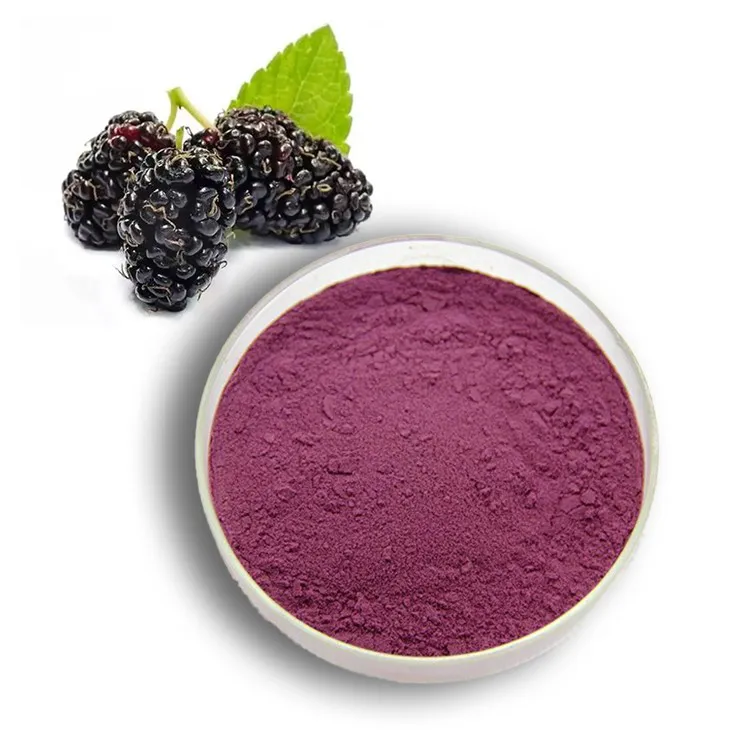- 0086-571-85302990
- sales@greenskybio.com
Mulberry Extract: Is the extract effective for weight loss?
2024-11-13

1. Introduction
In the modern pursuit of a healthy lifestyle and weight management, many are constantly on the lookout for natural and effective aids. Mulberry Extract has emerged as a potential candidate in this regard. Mulberries themselves have a long history of use in traditional medicine in various cultures. But does the extract derived from them truly have an impact on weight loss? This article aims to comprehensively explore this question by delving into its components, possible mechanisms of action, and existing research.

2. Components of Mulberry Extract
Mulberry Extract is rich in a variety of bioactive components, which may contribute to its potential weight - loss effects.
2.1 Polyphenols
One of the major groups of compounds in mulberry extract is polyphenols. These are known for their antioxidant properties. In the context of weight loss, polyphenols may play a role in metabolic regulation. For example, they can influence the activity of certain enzymes involved in energy metabolism. They also have the potential to reduce oxidative stress in the body, which is often associated with obesity - related metabolic disorders.
2.2 Flavonoids
Flavonoids are another important component of mulberry extract. They are widely recognized for their health - promoting effects. In terms of weight management, flavonoids may act on adipocytes (fat cells). Some studies suggest that flavonoids can inhibit the differentiation of pre - adipocytes into mature adipocytes, thereby reducing the overall amount of fat storage in the body. Additionally, flavonoids may also enhance lipid metabolism, promoting the breakdown of stored fats.
2.3 Dietary Fiber
Mulberry extract contains a certain amount of dietary fiber. Dietary fiber is well - known for its role in promoting satiety. When consumed, it can swell in the stomach, creating a feeling of fullness. This can lead to a reduction in overall food intake, which is an important aspect of weight loss. Moreover, fiber can also affect the gut microbiota. A healthy gut microbiota has been associated with better metabolic health and potentially a lower risk of obesity.

3. Mechanisms of Action for Potential Weight Loss
Understanding the mechanisms by which mulberry extract might contribute to weight loss is crucial.
3.1 Appetite Suppression
As mentioned earlier, the dietary fiber in mulberry extract can increase satiety. Additionally, some of the bioactive compounds may interact with the body's hormonal systems related to appetite. For instance, they might influence the levels of hormones such as ghrelin (the "hunger hormone") and leptin (the "satiety hormone"). By regulating these hormones, mulberry extract could potentially reduce the desire to eat, leading to a lower calorie intake.
3.2 Metabolism Boosting
The polyphenols and flavonoids in mulberry extract may enhance metabolic processes. They can potentially increase the basal metabolic rate (BMR), which is the amount of energy the body expends at rest. A higher BMR means that the body burns more calories even without additional physical activity. This can contribute to a calorie deficit, which is essential for weight loss. Some of these compounds may also enhance the function of mitochondria, the "powerhouses" of cells, which are involved in energy production.
3.3 Lipid Metabolism Regulation
Mulberry extract may play a role in lipid metabolism. It can potentially influence the synthesis, transport, and breakdown of lipids. For example, flavonoids may inhibit the activity of enzymes involved in lipid synthesis, reducing the production of triglycerides (a type of fat). At the same time, it may enhance the activity of enzymes responsible for lipid breakdown, such as lipase, which breaks down triglycerides into fatty acids and glycerol for energy utilization.

4. Research on Mulberry Extract and Weight Loss
Several studies have been conducted to investigate the relationship between mulberry extract and weight loss.
4.1 Animal Studies
In animal models, some research has shown promising results. For example, in a study on obese mice, those fed with a diet containing mulberry extract showed a significant reduction in body weight compared to the control group. The extract - fed mice also had improved lipid profiles, with lower levels of triglycerides and cholesterol in their blood. These findings suggest that mulberry extract may have a positive impact on weight and lipid metabolism in animals. However, it is important to note that animal studies may not always directly translate to human responses.
- Another animal study focused on the effect of mulberry extract on adipose tissue. It was found that the extract could reduce the size of adipocytes and the overall amount of adipose tissue in the animals. This indicates that mulberry extract may have a direct effect on fat cells, potentially through the mechanisms discussed earlier such as inhibiting adipocyte differentiation and promoting lipid breakdown.
4.2 Human Studies
In human studies, the evidence is somewhat more complex. Some small - scale clinical trials have reported positive effects of mulberry extract on weight loss. For instance, in a short - term study involving overweight individuals, those who took mulberry extract supplements in addition to following a balanced diet showed a slightly greater reduction in body weight compared to those who only followed the diet.
- However, other studies have not found significant differences in weight loss between groups taking mulberry extract and those not taking it. There are several factors that may contribute to these inconsistent results. One factor is the variability in the composition of mulberry extract used in different studies. Another factor is the differences in study design, such as the duration of the study, the dosage of the extract, and the characteristics of the study participants.
5. Considerations and Limitations
While the potential of mulberry extract for weight loss is an area of interest, there are several considerations and limitations that need to be taken into account.
5.1 Dosage and Standardization
Currently, there is no standardized dosage for mulberry extract in relation to weight loss. Different products on the market may contain varying amounts of the active components. This lack of standardization makes it difficult to compare the results of different studies and also poses a challenge for consumers in determining the appropriate dosage. Without a clear understanding of the optimal dosage, it is hard to ensure the effectiveness of mulberry extract for weight loss.
5.2 Quality of Extract
The quality of mulberry extract can vary greatly depending on factors such as the source of the mulberries, the extraction method, and the manufacturing process. Poor - quality extracts may not contain sufficient amounts of the bioactive components or may be contaminated with other substances. This can affect the potential effectiveness of the extract for weight loss. Consumers should be cautious when choosing mulberry extract products and look for reliable brands with high - quality manufacturing processes.
5.3 Overall Lifestyle Factors
It is important to note that weight loss is a complex process that is influenced by multiple factors. While mulberry extract may have potential benefits, it cannot replace a healthy lifestyle. A balanced diet, regular physical activity, and sufficient sleep are still essential for achieving and maintaining a healthy weight. Mulberry extract should be seen as a potential adjunct to these lifestyle factors rather than a sole solution for weight loss.
6. Conclusion
In conclusion, mulberry extract contains components such as polyphenols, flavonoids, and dietary fiber that have potential mechanisms for contributing to weight loss, including appetite suppression, metabolism boosting, and lipid metabolism regulation. While animal studies have shown some promising results, human studies have been more inconsistent. There are also important considerations regarding dosage, quality of the extract, and the role of overall lifestyle factors. More research is needed, particularly well - designed, large - scale human trials, to further clarify the effectiveness of mulberry extract for weight loss. Until then, it is important for individuals interested in using mulberry extract for weight loss to approach it with caution and in conjunction with a healthy lifestyle.
FAQ:
Question 1: What are the main components in mulberry extract that might be related to weight loss?
Mulberry extract contains several components that could potentially be related to weight loss. One of the main components is flavonoids. Flavonoids have antioxidant properties and may help regulate metabolism. Another component is alkaloids, which might influence the body's physiological processes related to energy expenditure and fat metabolism. Additionally, mulberry extract contains dietary fiber, which can increase satiety, reducing overall calorie intake.
Question 2: How does mulberry extract affect metabolism?
The components in mulberry extract may affect metabolism in different ways. Flavonoids, for example, can interact with enzymes involved in metabolism. They may enhance the activity of certain enzymes that are responsible for breaking down fats and carbohydrates, thus increasing the rate at which the body burns energy. Alkaloids might also play a role in modulating the hormonal balance related to metabolism, such as insulin sensitivity, which can impact how the body stores and uses energy.
Question 3: Are there any scientific studies supporting the effectiveness of mulberry extract for weight loss?
Yes, there are some scientific studies on this. Some research has shown that mulberry extract can have an impact on weight loss in animal models. For example, in studies on obese rats, mulberry extract supplementation led to a reduction in body weight and body fat percentage. However, it should be noted that while these studies are promising, more research, especially in human subjects, is needed to fully confirm its effectiveness for weight loss in humans.
Question 4: Can mulberry extract reduce appetite?
There is evidence to suggest that mulberry extract may help reduce appetite. As mentioned earlier, the dietary fiber in mulberry extract can increase satiety. When consumed, it can make a person feel fuller for longer, which may lead to a reduction in overall food intake. This can potentially contribute to a calorie deficit and aid in weight loss.
Question 5: How should mulberry extract be consumed for potential weight loss?
If considering using mulberry extract for potential weight loss, it can be consumed in various forms. It is available as a dietary supplement in capsule or powder form. However, it is important to follow the recommended dosage instructions provided by the manufacturer. It can also be consumed as part of a diet rich in fruits and vegetables if one chooses to obtain it from natural sources. But again, it should be used in combination with a healthy diet and regular exercise for optimal results.
Related literature
- The Effects of Mulberry Extract on Obesity: A Review"
- "Mulberry Extract and its Impact on Metabolic Syndrome"
- "Investigating the Role of Mulberry Extract in Weight Management"
- ▶ Hesperidin
- ▶ citrus bioflavonoids
- ▶ plant extract
- ▶ lycopene
- ▶ Diosmin
- ▶ Grape seed extract
- ▶ Sea buckthorn Juice Powder
- ▶ Beetroot powder
- ▶ Hops Extract
- ▶ Artichoke Extract
- ▶ Reishi mushroom extract
- ▶ Astaxanthin
- ▶ Green Tea Extract
- ▶ Curcumin Extract
- ▶ Horse Chestnut Extract
- ▶ Other Problems
- ▶ Boswellia Serrata Extract
- ▶ Resveratrol Extract
- ▶ Marigold Extract
- ▶ Grape Leaf Extract
- ▶ blog3
- ▶ blog4
- ▶ blog5
-
Organic Tongkat Ali extract powder factory.
2024-11-13
-
How to make powder with ashwagandha extract.
2024-11-13
-
Rosehip extract manufacturers from China.
2024-11-13
-
The best cat's claw extract in nature.
2024-11-13
-
Chinese Dandelion Leaf Extract Suppliers.
2024-11-13
-
Hawthorn powder
2024-11-13
-
Giant Knotweed Extract
2024-11-13
-
Epimedium extract powder
2024-11-13
-
Cocoa Extract
2024-11-13
-
Uridine-5'-monophosphate Disodium salt
2024-11-13
-
Curcuma Longa Extract
2024-11-13
-
Black Pepper Extract
2024-11-13
-
Hericium erinaceus extract powder
2024-11-13
-
Eyebright Extract
2024-11-13
-
Shikone Extract
2024-11-13





















